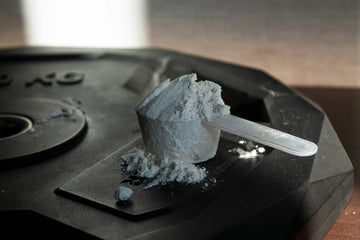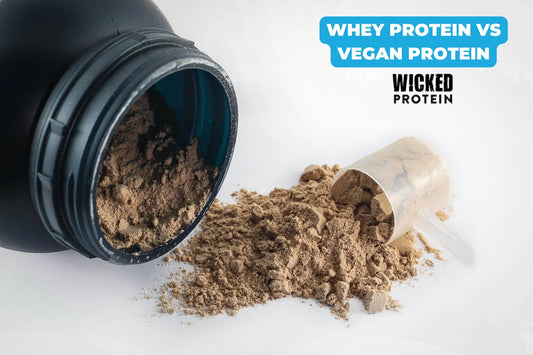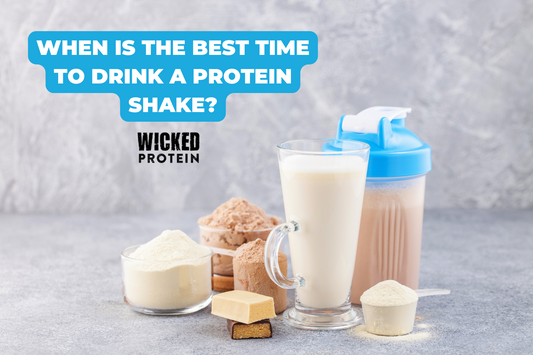
Why Do Amino Acids Matter For Your Workout?
What are amino acids?
Amino acids are molecules that are the building blocks of protein and play a vital role in muscle growth, recovery, and overall fitness.
They’re responsible for protein synthesis, which is the process by which your body builds new tissue.
Taking amino acid supplements can provide your body with the essential nutrients it needs to repair and build muscle, leading to accelerated muscle growth.
They’re still relatively unexplored in the wellness world, so you may be curious about how they can actually impact your work.
In this article, we’ll cover why amino acids matter for your workout and their importance in muscle growth.
The science behind amino acids and muscle growth
Amino acids are the building blocks of proteins, which are essential for muscle growth and repair.
When you engage in intense exercise, you create micro-tears in your muscle fibers.
These tears need to be repaired for your muscles to grow stronger.
Amino acids help speed up this repair process.
There are two types of amino acids: essential and non-essential.
Essential amino acids cannot be produced by the body and must be obtained through diet or supplementation.
Non-essential amino acids, on the other hand, can be produced by the body.
Essential Amino Acids for Muscle Growth:
There are nine essential amino acids that are crucial for muscle growth: leucine, isoleucine, valine, lysine, methionine, phenylalanine, threonine, tryptophan, and histidine.
These amino acids cannot be made by the body and must be obtained through food or supplementation.
Leucine, isoleucine, and valine are important for muscle growth and they are classified as branched-chain amino acids (BCAAs).
BCAAs make up a large portion of the amino acids found in muscle tissue and play an important role in protein synthesis.
They also help reduce muscle breakdown during exercise, leading to faster recovery and enhanced muscle growth.
To make sure you’re getting enough essential amino acids, It’s important to consume a diet that includes protein-rich foods like meat, eggs, fish, dairy, and other sources of protein.
Additionally, supplementing with BCAA powders or capsules is a great way to meet your daily protein requirements if you’re following a vegetarian or vegan diet.
Non-Essential Amino Acids for Muscle Growth
While essential amino acids are necessary for muscle growth, non-essential amino acids also play a role in supporting overall muscle health.
Non-essential amino acids can be produced by the body, but their production may be limited during periods of high physical stress, such as intense exercise.
Glutamine is the most common non-essential amino acid in the body and is important for muscle recovery and immune function.
Glutamine can be found in:
- Animal proteins: chicken, beef, fish, and eggs
- Dairy products: milk, cheese, and yogurt
- Plant-based sources: beans, peas, lentils, and spinach
During exercise, glutamine levels can become depleted, which can slow muscle repair and growth.
Supplementing with glutamine can help refill these levels and support optimal muscle recovery.
Another important non-essential amino acid is arginine.
Arginine is involved in the production of nitric oxide, which helps improve blood flow and nutrient delivery to the muscles.
Arginine can be found in:
- Nuts and seeds: Walnuts, almonds, pumpkin seeds, and sunflower seeds
- Meat: pork loin, turkey, chicken, and beef
- Seafood: salmon, shrimp, and tuna
- Legumes: soybeans, peanuts, and chickpeas
The role of Branched-Chain Amino Acids (BCAAs) in Muscle Growth
Branched-chain amino acids (BCAAs) are three special amino acids: leucine, isoleucine, and valine.
These are especially important for muscle growth and recovery due to their unique structure and function.
Leucine, in particular, activates the mTOR pathway, which is responsible for protein synthesis
Leucine can be found in:
- Meat and poultry: chicken breast, beef, and pork
- Fish: salmon and tuna
- Dairy products: milk, cheese, and yogurt
- Eggs: egg whites
Isoleucine and valine, the other two BCAAs, also contribute to muscle growth and recovery.
Isoleucine helps regulate blood sugar levels during exercise, while valine plays a role in energy production and muscle repair.
Isoleucine can be found in:
- Meat: turkey, chicken, and lamb
- Fish: tuna, mackerel, and salmon
- Cheese: especially cottage cheese
- Legumes: lentils, chickpeas, and soybeans
Valine can be found in:
- Cheese: hard cheese like Parmesan
- Meat: beef, pork, and chicken
- Mushrooms: shiitake mushrooms
- Nuts and seeds: almonds, peanuts, and pumpkin seeds
Together, these three amino acids work to support optimal muscle growth and recovery.
How To Incorporate Amino Acids
Consume a balanced diet
Make sure you’re consuming enough protein-rich foods to provide your body with the essential amino acids it needs to grow muscles.
This includes lean meat, fish, eggs, dairy products, and plant-based protein sources in your meals.
Supplementation
If you’re on certain dietary restrictions, you might struggle to meet your protein needs through diet alone.
Supplementing amino acids with powders or capsules is a great way to make sure you’re getting enough nutrients for your body to grow and recover.
Timing is also key, so if you’re supplementing, make sure to time it around your workouts.
Stay Hydrated
Proper hydration is essential for all the nutrients to be absorbed.
Make sure you drink enough water during the day, especially during and after your workouts.
Not only will it make you feel better, hydration also has positive benefits on overall health.
Listen to your body
You’ve heard this before, but, everyone IS different.
Your protein needs and tolerance to supplementation are different in comparison to your friend or gym partner.
Pay attention to how your body responds to different supplements or foods and experiment.
If you experience any side effects, consult with a doctor.
The Benefits of Using Amino Acids
Faster Muscle Growth
Amino acid supplementation can stimulate protein synthesis, which leads to increased growth and repair of your muscles.
This can help you achieve your fitness goals quickly and easily.
Faster Recovery
By giving your body the essential building blocks for muscle repair, you can speed up the process of recovery and reduce muscle soreness after a great workout.
Increased Endurance
BCAAs can help delay fatigue during exercise, which means you’ll be able to push harder and train longer.
Preservation of lean muscle
Amino acid supplementation can help preserve your hard-earned muscle mass during a calorie deficit or intense workouts.
Potential Side Effects of Amino Acids
Digestive issues
Some people may experience discomfort, bloating, gas, or even diarrhea when taking amino acids.
It’s recommended to start with a low dosage and slowly increase it.
Allergies
In rare cases, some may have an allergic reaction to amino acids with symptoms such as rash, itching, and difficulty breathing.
Overconsumption
Excessive intake of amino acids can lead to imbalances in your body and various health risks.
It’s important to follow the recommended dosage and follow a balanced diet.
Remember, amino acids are a supplement, not a replacement for your diet.
Takeaways
By adding amino acids to your workout routine, either through a well-balanced diet or supplements, you can speed up your muscle growth, repair, and recovery.
Remember to follow a balanced diet that includes a variety of protein and other vital nutrients.







